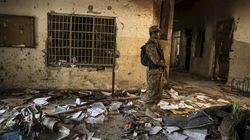Pakistan's post-Peshawar path

December 16 marks the one year anniversary of the Peshawar school massacre, the deadliest attack on a civilian or military target in Pakistan's history. The attack killed more than 150 people, most of them children from army families.
The country's leaders promised to crackdown in the wake of the attack, and the past year has seen an intense offensive on groups such as the Pakistani Taliban (also known as Tehreek-e-Taliban), which was responsible for the massacre. The offensive, known as Zarb-e-Azb, has received significant public support and been credited with a major drop in civilian deaths from "terrorist violence", the fewest since 2006.
But some argue problems have just been pushed across the border into Afghanistan, and that conditions for an uptick in violence still exists. When it comes to the state's methods, civil rights groups have criticised the resumption of capital punishment after a six year moratorium, as well as the Supreme Court's decision to allow terror suspects to be tried in military courts. Due to the country's history of military dictatorships – Pakistan's first civilian transfer of power took place in 2013 – many are concerned with the army's increased influence. They worry the use of the courts may soon extend to political opponents of the army.
So, one year on from witnessing the deadliest attack on their soil, how do Pakistanis feel about their safety and their future?
Trailer
Recently Updated Shows

The Creep Tapes
Based on a collection of videotapes in the secret vault of the world's deadliest and most socially uncomfortable serial killer, who hires his victims to film him for the day under false pretenses, each episode exposes a new victim from one of the fabled 'Creep Tapes'.

America's Funniest Home Videos
ABC's longest-running primetime entertainment show, America's Funniest Home Videos, returns for season 36 this fall with the same mission -- giving families something genuinely funny to enjoy together on Sunday nights.
"AFV," the longest-running primetime entertainment show in ABC history, returns for season 36 with the same mission - to provide viewers with hysterical moments that fly by at a dizzying pace.

The Real Housewives of Potomac
Just up the river from our nation's capital lies a hidden gem—Potomac, Maryland. Its rolling hills, gated mansions, sophisticated prep schools, and exclusive country clubs all serve to keep the area invitation-only. Sprinkled throughout this community are a handful of old-line, wealthy African-American families who have historically broken racial barriers to provide a life of privilege for their children. The Real Housewives of Potomac follows the upscale lives of six intriguing, well-to-do women: Gizelle Bryant, Katie Rost, Karen Huger, Charrisse Jackson-Jordan, Robyn Dixon, and Ashley Darby, all of whom have fought for their places in this society by way of legacy or marriage. In a town where entry is granted only through class, pedigree, and lineage, how far will these ladies go to secure their spot at the top of this prestigious circle?

The Traitors Canada
Follow a group of contestants – including some familiar faces – who live together as they complete a series of challenges with the goal of earning a cash prize. The catch? Some of the contestants are traitors who will attempt to deceive and manipulate their way to the prize instead of sharing it amongst the group. In this psychological adventure will the traitors be unmasked in time?
